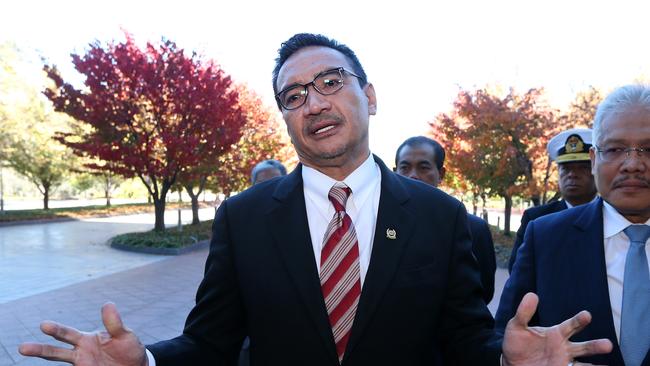Malaysia to consult China over AUKUS alliance
Kuala Lumpur has urged Australia to do more to allay the concerns of ASEAN nations over the nuclear subs deal.

Malaysia has urged Australia to do more to allay the concerns of ASEAN nations over the AUKUS security partnership with the UK and the US, and flagged a visit by its defence minister to China to discuss the issue.
Hishammuddin Hussein told parliament on Wednesday he had advised his Australian counterpart, Peter Dutton, to speak with ASEAN chair Brunei and to allay concerns of those ASEAN countries closest to Beijing, such as Cambodia, Myanmar and Laos.
Mr Hishammuddin – who when foreign minister described his Chinese counterpart Wang Yi as his big brother – said he would also visit Beijing soon to “get the views of their leadership, particularly their defence, on AUKUS and what could be their action”.
Of the 10 member states of the Association of Southeast Asian Nations, Indonesia and Malaysia have expressed the most concern over the potential for the pact – which will allow Australia to acquire nuclear-powered submarines – to exacerbate regional tensions and heighten the risk of conflict.
Malaysia analyst James Chin said Malaysia was “likely playing both sides”, given its heavy reliance on Chinese investment “but they’re genuinely worried because the number of close encounters between Western and Chinese navies has tripled in the last five years and they fear that with Australia playing this role, things will get worse”.
The level of concern in Jakarta prompted Scott Morrison to call President Joko Widodo on Tuesday, and the senior advisory group of the Indonesia-Australia Defence Alumni Association (IKAHAN) to schedule a virtual meeting to discuss the issue.
Indonesia said it was “deeply concerned at the continuing arms race and power projection in the region”, while Malaysian Prime Minister Ismail Sabri Yaakob warned of the potential for AUKUS to “provoke other powers to act more aggressively”.
There is also concern that Australia’s acquisition of nuclear-powered submarines will lead to it becoming a nuclear-armed state.
The Prime Minister has repeatedly assured neighbours that Australia has no intention of acquiring nuclear weapons.
But Bilahari Kausikan, Singapore’s former foreign secretary and a hawkish policy expert, wrote this week that “changes in the strategic environment and in particular Chinese behaviour” were pushing not only Australia but South Korea and Japan in that direction.
Mr Kausikan said AUKUS should be seen in the context of China refining its so-called second strike capability – the ability to absorb a nuclear attack and have sufficient nuclear weapons to retaliate – and the fact the foundation of Asian stability was the extended US nuclear deterrence.
“The Indo-Pacific is on a trajectory that will eventually lead to an eight-way balance of mutually assured destruction between the US, China, Russia, India, North Korea, Japan, South Korea and Australia,” he wrote in Singapore’s Straits Times.
“Deterrence through the prospect of mutually assured destruction kept a long peace between the US and the Soviet Union. It will keep the peace between the eight Indo-Pacific nuclear weapon and potential nuclear weapon states.”
The Lowy Institute’s Southeast Asia program director, Ben Bland, said it was exactly that scenario that ASEAN nations dreaded: that acquiring nuclear-powered submarines would “put Australia on a pathway where the proliferation of nuclear weapons was a possibility”.
“There are fears this military build-up will end in conflict in their backyard that they don’t really have much say in,” he said.
Mr Bland said Australia should be prepared to discuss the AUKUS pact with its neighbours “from the point of view of honest difference” rather than assuming all ASEAN nations were feigning concern to assuage an important trading partner and bullying neighbour.
“Indonesia’s position on China is really different from Australia’s and, if anything, it’s moving closer to China. It’s undeniable Indonesia and Australia are moving in literally polar opposite directions when it comes to China, which doesn’t mean they don’t share concerns,” he said.
“Australia’s realignment towards China is not new but it crystallises divisions, so these frictions will increase slowly over time and China will try to exploit them.”




To join the conversation, please log in. Don't have an account? Register
Join the conversation, you are commenting as Logout